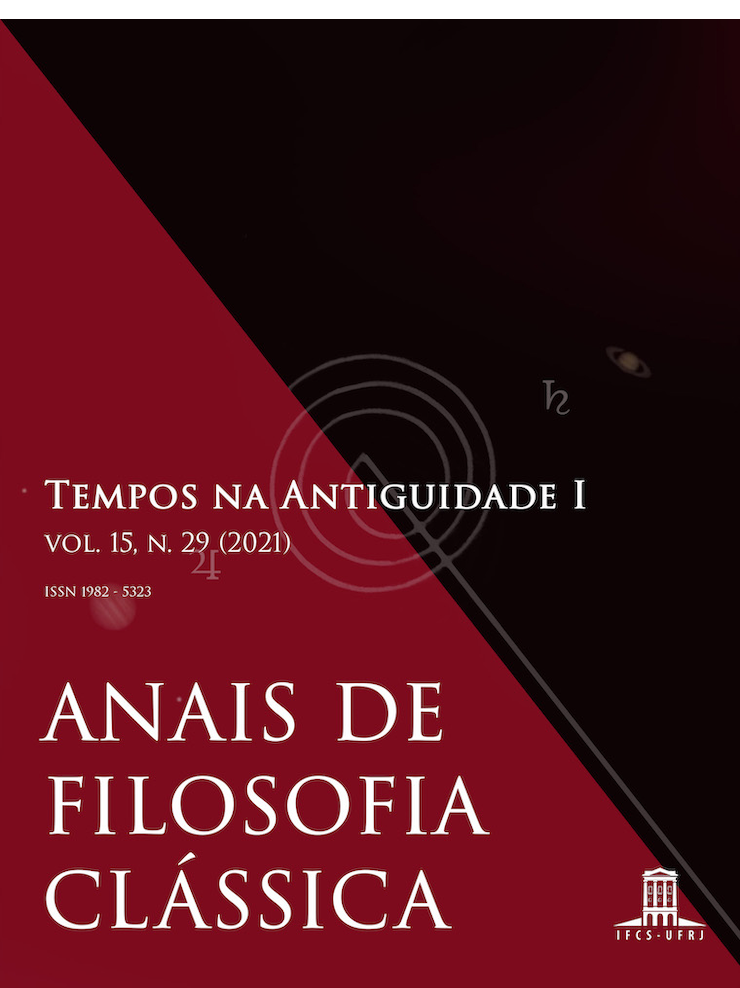O método de “divisão” e a temporalidade no conhecimento das Ideias platônicas
DOI:
https://doi.org/10.47661/afcl.v15i29.45857Keywords:
Division, Ideas, Time, Recollection, PlatoAbstract
In Plato’s Statesman, the character Stranger of Elea establishes that, in the method of division, it is not enough to realize the “divisions”, but it is also fundamental the divided parts corresponding to really existing Ideas (262b-263a). His interlocutor, the character “young Socrates”, replies with a disconcerting question: “but, regarding that, how one can know that the genus and the part (so rendered more visible) are not the same but different from each other?” (263a). The question strikes the Stranger so hardly that he has no words to answer the young man. The reason seems to rest in the fact that the question points to the “circular” feature of the method of division, due to which, since the Antiquity, it receives the charge of being a petitio principii. The “circularity” in the time would be as following: if, in the outcomes of the divisions, what matters is the Ideas to become more visible to someone (Statesman 262b), on the other hand, the correct divisions only could be realized by the person who is somehow already “contemplating” the very structure of the Ideas (Sophist 253b-e). In Aristotle’s words, the division “is a weak syllogism”, because it reaches or tries to prove that from which it starts as a presupposition (Pr. An. 46a33). Nonetheless, the analysis of the Platonic dialogues’ passages on the “recollection” as well on the relationship between the Ideas and the time can indicate that Plato would have a rather surprising and interesting answer to his notable disciple.
Downloads
References
ACKRILL, J. L. In defense of Platonic Division. In: ____________ Essays on Plato and Aristote. Oxford: OUP, 2007 (1997).
AMBUEL, D. Pigs in Plato: Delineating the Human Condition in the Statesman. In: HAVLICEK, A.; JIRSA, J.; THEIN, K. (ed.). Plato’s Statesman. Proceedings of the Eighth Symposium Platonicum Pragense. Prague: Oikoymenh, 2013.
BLUCK, R. S. Plato's Sophist, a commentary. Manchester: G. C.Neal, 1975.
BRISSON, L. Introduction. In: PLATON. Phèdre. Paris: GF Flammarion, 2000.
BRONSTEIN, D. Aristotle on Knowledge and Learning. The Posterior Analytics. Oxford: OUP, 2016.
BROWN, L. Definition and Division in Plato's Sophist. In: CHARLES, D. (ed.). Definition in Ancient Philosophy. Oxford: OUP, 2010.
CASERTANO, G. True and Right in the Statesman. In: BOSSI, B; ROBINSON, T. (ed.). Plato’s Statesman Revisited. Berlin: De Gruyter, 2018.
CHARLES, D. The Paradox in the Meno and Aristotle’s Attempts to Resolve It. In: CHARLES, D. (ed.). Definition in Ancient Philosophy. Oxford: OUP, 2010.
CHERNISS, H. L'enigme de I'ancienne Academie. Transl. L. Boulakia. Paris: Vrin, 1993.
CORDERO, N.-L. Introduction. In: PLATON. Le sophiste. Trad. de Nestor Cordero. Paris: GF Flammarion, 1993.
CORNFORD, F. M. Plato's theory of knowledge, the Theetetus and the Sophist of Plato. London: Routledge & Kegan Paul, 1951.
DIXSAUT, M. Métamorphoses de la dialectique dans le dialogues de Platon. Paris: Vrin, 2001.
FIGAL, G. Finding the Right Concepts: On Dialectics in Plato’s Statesman. In: SALLIS, J. (ed.). Plato’s Statesman. Dialectic, Myth, and Politics. New York: State University of New York Press, 2017.
FREDE, D. Not in the Book. How does recollection work? In: HAVLICEK, A.; KARFÍK, F. (ed.). Plato’s Phaedo. Proceedings of the Second Symposium Platonicum Pragense. Prague: Oikoymenh, 2001.
GILL, M. L. Division and Definition in Plato’s Sophist and Statesman. In: CHARLES, D. (ed.). Definition in Ancient Philosophy. Oxford: OUP, 2010.
GUTHRIE, W. K. C. A History of Greek Philosophy. Cambridge: UCP, 1962.
MORAVCSIK, J. M. E. The Anatomy of Plato's Divisions. In: LEE, E. N.; MOURELATOS, A. P. D.; RORTY, R. M. (Ed.). Exegesis and Argument. New York: Assen, 1973.
PAES, C. L. M. Platão: o instante e a caverna. In: Sofia 07 (2001). Vitória: UFES.
PHILIP, A. Platonic diairesis. Transactions of the American Philosophical Society 97 (1966) p. 335-358.
ROSEN, S. Plato's Sophist. The drama of original and image. New Haven/ London: YUP, 1983.
SOUZA, E. C. Discurso e Ontologia em Platão. Injuí: UNIJUÍ, 2009.
WEDIN, M. Collection and Division in the Phaedrus and Statesman. Revue de Philosophie Ancienne 5 (1987), p. 207–233.


